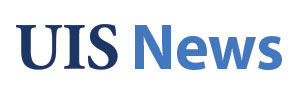On February 9, Dr. Peter Boltuc (MAT/PHI) and I were panelists on the Innovate Springfield event AI: “The Next Gold Rush.” The other panelists were Jeff Schneider, founder and CEO of BrandOps, and Prashanth Sankaran, VP of Digital Solutions at Bunn. The event was hosted by Bruce Sommer, Director of Economic Development and Innovation at UIS.
The event was dominated by everyone’s enthusiasm on ChatGPT–the AI chatbot by OpenAI that is taking the world by storm. It was launched in November 2022. Within days of its launch, it had over a million users signed up. By the beginning of February, it had 100 million active users (vs. nine months for TikTok and 2.5 years for Instagram to hit the 100 million users mark).
We had Nana Rubio, MAT/PHI Social Media Ambassador, at the event for reporting. Afterward, Nana and I discussed how we could best report this event. We both felt that it would be fun to have her write the media release, with the help of ChatGPT! See her reporting below.
ChatGPT will transform our lives in so many different ways. It also means opportunities for you all–math majors and philosophy majors. We will go on to report this exciting breakthrough (and how it could affect you, your learning and career).
After the February 9 event, I also gave a talk on ChatGPT (Implications of ChatGPT beyond Education at the UIS Center for Faculty Excellence on February 23). Dr. Liang Kong (MAT/PHI) will give a talk on other aspects of AI/ChatGPT later this Spring (also at UIS Center for Faculty Excellence)--more details to come. This summer, MAT will offer a topic course on the mathematical and conceptual framework of ChatGPT and other Large Language models. For more information, contact me (hchan1@uis.edu).
(Dr. Hei-Chi Chan, MAT/PHI, Feb. 28, 2023)
Keywords: UIS, Mathematics, Philosophy, AI, ChatGPT
MAT/PHI Social Media Ambassador, Feb. 28, 2023
After attending the panel of “AI: The Next Gold Rush” I was left with many ideas and numerous questions. The panelists consisted of two professors, a vice president of digital solutions, and a thought leader in “generative marketing”. Although the panel was diverse so was the audience, also attending were students, professors, and business owners. The conversation began with the foundations of AI and how it has grown to be today. We were then introduced to the application ChatGPT which is an auto-generative chatbot system. The audience then began talking about the many positives it can implement such as double checking one's work, serving as an employee, and can be used for automated customer service. While some negativities are that not every response given by the chatbot is reliable, some responses may be biased, and plagiarism is more at risk.
Following the conversation of ChatGPT I took it upon myself to make an account and see what had sparked the overall conversation. After creating my account I began to ask simple questions and even ones just out of curiosity to see what the chatbot can generate as its answers. Which then led me to asking questions based off of my current job position as the Social Media Ambassador for Mathematics and Philosophy at University of Illinois Springfield. For instance, I had asked how I would be able to create content that is not only eye catching but also interactive. The chatbot then created a list of ideas and even examples of what I should post and do. This then broadened my idea of how much knowledge it carries and what it can produce.
Although ChatGPT is fairly new to the world it is already being banned in schools. The reasoning for this as stated above is that there is more room for plagiarism within the students. This was also brought up during the discussion and where I developed the opinion that it should not be banned from schools or any work place in general. For instance, a high school student who attended this event in relation to his entrepreneurship class explained how he was tasked to create a business for this class. The student then proceeded to ask ChatGPT how to create an app for his business and the chatbot gave him a code and how to begin the process. He then was able to produce an app for his business and further improve his website. After considering the possible outcomes whether they are negative or positive one can use this chatbot as a way to begin research instead of a reliable resource. Once students and teachers learn how to use the application they will be able to use it for their benefit instead of a way of plagiarism or not having any knowledge about it at all. Overall, after attending the panel and using ChatGPT myself I am able to see the amount of doors and ideas the chatbox can give. We just need to access them.



